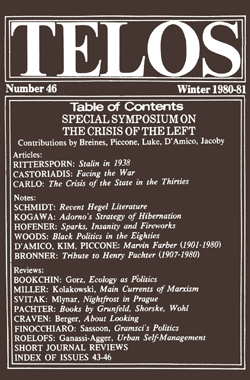With the publication of “The Crisis of Western Societies” (1982), Cornelius Castoriadis returns to an early theme in his work by proposing that over the previous twenty years Western societies had begun to enter a new phase, one that could be considered to be a situation of crisis. In his earlier political thought—associated with Socialisme ou Barbarie—Castoriadis identified signs of a transition into this new phase, marked by a widespread bureaucratization of political decision-making that emerged alongside a general turn toward the privatization of social life. At the time of his revisitation of this theme, Castoriadis’s work had undergone what would be the first of two ontological turns: a turn that involved a radical rethinking of historicity, which understood the historical dimension of society as a socially contingent mode of creation that is central to the constitution of the world of a given society. This article reflects an articulation of his previous theme of crisis with regard to this broader rethinking of historicity throughout the 1970s, which extended political analysis into more foundational issues of social institution and cultural expression.
|
Castoriadis’s analysis here is an updated version of the assessment of Russian society that had been developed within Socialisme ou Barbarie. Castoriadis makes a compelling argument that Russia had regenerated itself into a full-blown stratocracy, armed to the teeth and yet still unable to provide its citizens with a functional civic bureaucracy; a decade later he reflects that a core argument of “Facing the War” was that brute force had become the sole signification holding this society together. Castoriadis’s argument operates at two levels: as a political analysis of Russian bureaucratic spheres (the comparison of military capacity between superpowers and a critique of rational determinism within the justification of Cold War strategy—i.e., M.A.D.); and as a political judgement of the imaginary significations that served to orient Russian society. It is through the latter level that lessons on historical contingency are astutely relevant to the contemporary world situation. |
||||
|
Telos Press Publishing · PO Box 811 · Candor, NY 13743 · Phone: 212-228-6479 Privacy Policy · Data Protection Copyright © 2025 Telos Press Publishing · All Rights Reserved |
||||
 “Facing the War” is a translation from the first section of Devant la guerre, Cornelius Castoriadis’s least regarded work within English-speaking circles. The reason for this marginalization is its central claim that Russian society had transformed into a stratocratic regime, with increased probability for an escalation into a Third World War. Castoriadis’s critics claimed he had missed signs of perestroika and glasnost already on the horizon. Viewed from this perspective, history could not have been more cruel to Castoriadis. However, the value of his work does not depend on a predictive mode of political analysis, a point that is clearly prefaced in this work: calls for predictive accuracy ignore the radical character of historical contingency. In fact, the unexpected events put into motion later by Gorbachev only strengthen Castoriadis’s perspective in the sense that such a development represents the deeper problem of historical indeterminacy, and it is in this respect that his analysis is finely tuned to any society’s condition of historical contingency.
“Facing the War” is a translation from the first section of Devant la guerre, Cornelius Castoriadis’s least regarded work within English-speaking circles. The reason for this marginalization is its central claim that Russian society had transformed into a stratocratic regime, with increased probability for an escalation into a Third World War. Castoriadis’s critics claimed he had missed signs of perestroika and glasnost already on the horizon. Viewed from this perspective, history could not have been more cruel to Castoriadis. However, the value of his work does not depend on a predictive mode of political analysis, a point that is clearly prefaced in this work: calls for predictive accuracy ignore the radical character of historical contingency. In fact, the unexpected events put into motion later by Gorbachev only strengthen Castoriadis’s perspective in the sense that such a development represents the deeper problem of historical indeterminacy, and it is in this respect that his analysis is finely tuned to any society’s condition of historical contingency. 

